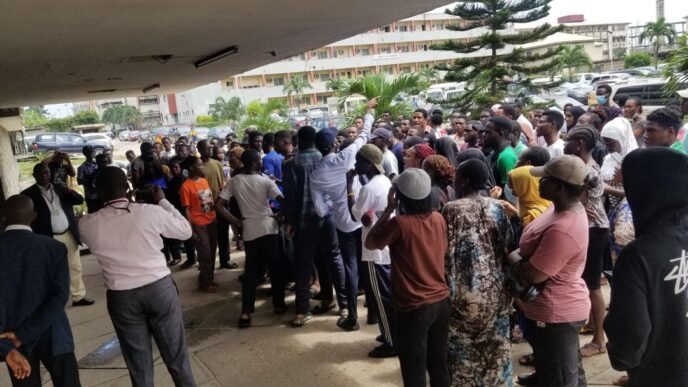ASUU president Emmaniuel Osodeke and other union members.
The Academic Staff Union of Universities (ASUU) has rejected the federal government’s proposed alternative payroll platform intended to replace the IPPIS.
The IPPIS, Integrated Personnel and Payroll Information System, was introduced in 2006 to manage the salaries of public sector workers.
Administered by the office of the accountant-general, the platform had increasingly accommodated federal tertiary institutions by 2016.
It however became the subject of heated protests for many public tertiary institutions over alleged unilateral manipulation and fraud.
Advertisement
Administrators across universities, polytechnics, and colleges of education argued that its centralised nature eroded the powers of provosts and governing councils since the head of the civil service often had to determine what staffers were employed and when.
ASUU had proposed the Unified Treasury Accounting System (UTAS) as an alternative, subjecting it to the government’s integrity tests.
But the National Information Technology Development Agency (NITDA) said the UTAS had failed three of its integrity tests.
Advertisement
In October 2024, the federal government rolled out guidelines for the removal of federal tertiary institutions from the IPPIS.
It said institutions will now self-process and forward their payroll to the IPPIS department of the accountant-general’s office for vetting.
Payment is then to be done through the Government Integrated Financial Management Information System (GIFMIS) from November.
ASUU, which is a major stakeholder in the tussle with the federal government over payroll management, has rejected the GIFMIS.
Advertisement
Emmanuel Osodeke, the ASUU president, said the union’s stance is in line with the autonomy of the nation’s tertiary institutions.
“The finances of the university should be managed by the governing council. That’s what the law says. It does not say by the accountant general’s office,” he said.
“Every year, the governing council directs the vice-chancellor to defend its budget at the national assembly. When the budget is approved including salary, remuneration, and overhead, it will go to the president for assent and it becomes a law.
“That money should be released to the governing council to pay its staff. That is the autonomy we are talking about as stipulated in the law.”
Advertisement
Osodeke said the union had rejected the IPPIS because its implementation not only eroded university autonomy but meddled with its internal affairs and violated Section 24A of the Universities Miscellaneous Provisions (Amendment) Act 2003.
He said universities should be given autonomy to be able to plan for staff member recruitment and how to pay their salaries.
Advertisement
Osodeke faulted the guidelines by the government detailing the process for the formal exit of federal tertiary institutions from IPPIS.
He said the accountant-general is playing games with ASUU by transferring the union to what he termed an “appendage” of the IPPIS.
Advertisement
Add a comment













